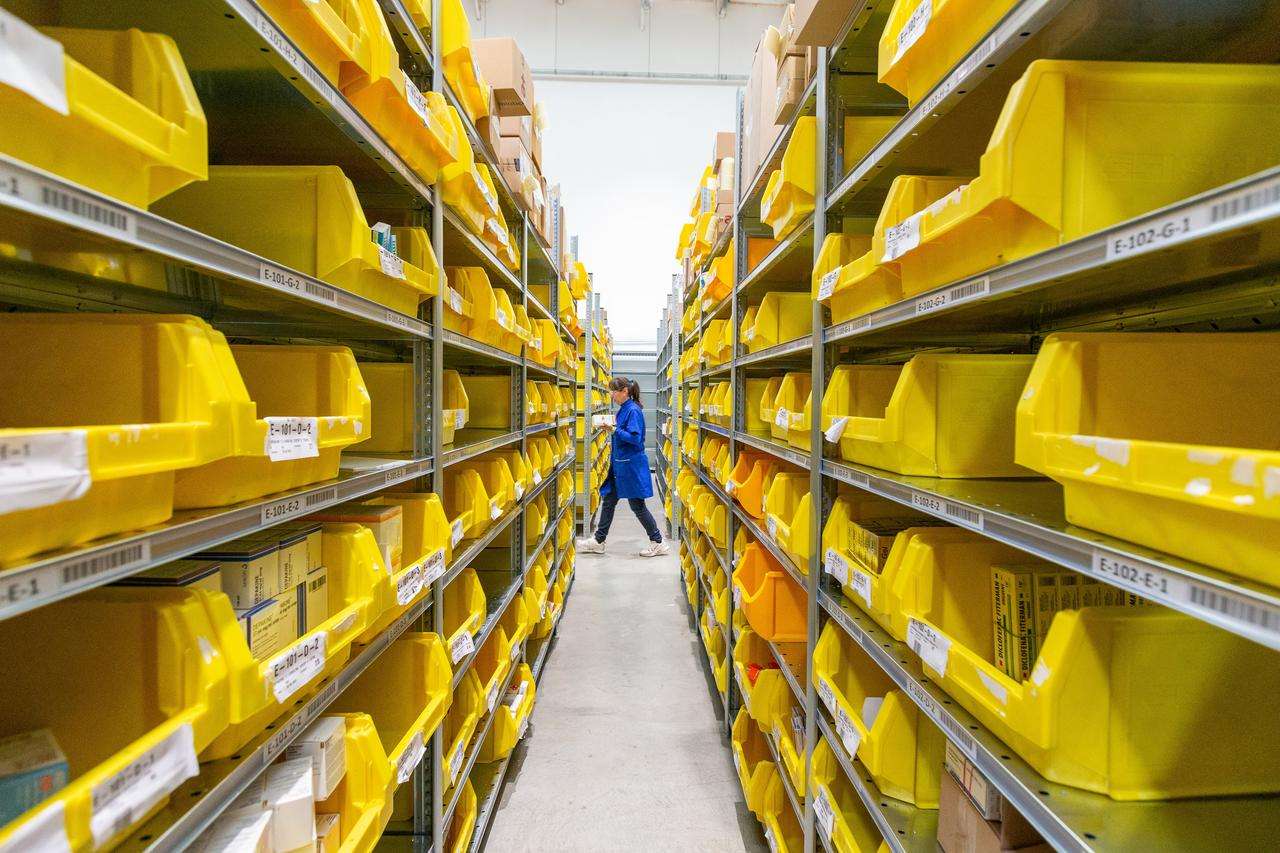
Secure, Timely Deliveries in Pharma Logistics
The pharmaceutical industry plays a crucial role in ensuring that life-saving medications are delivered safely and, most importantly, on time. This logistics niche covers more than medicines and vaccines in the biotechnological industries. The stakes are high, as any delay in delivery shipping medicine can have significant consequences for patient health and treatment outcomes.
Pharma products, including specialized medications, require strict temperature control and-controlled storage and distribution to maintain their integrity during transportation, presenting unique challenges.
To import and export pharmaceuticals efficiently, businesses need to leverage logistics providers who can balance both clinical and commercial, with global capabilities and local, on-the-ground knowledge to successfully navigate complexities.
In this article, DFA focuses on the vital importance of timely delivery within the pharmaceutical logistics landscape, emphasizing the integration of advanced solutions and strategic partnerships to navigate the challenges of 2024 and beyond.

The Pivotal Role of Timely Delivery
The traditional supply chain management landscape was like trying to navigate blindly, as companies faced challenges in knowing where their products were and how they were doing. But things have shifted with the introduction of IoT technology. Picture each part, package, or delivery behaving like a small messenger, always keeping you informed about its whereabouts, condition, and progress instantly. With IoT sensors providing real-time tracking and monitoring of products, this level of transparency allows businesses to track their products’ entire shipping route from manufacturing plants to customers’ homes.
Leveraging IoT in Supply Chain Management for Informed Decisions
Timely delivery in pharmaceutical product logistics is more than a logistical goal—it’s a critical component of patient care. Hard lessons in the resilience of the pharmaceutical systems and supply chains were learned due to the critical need for the control of COVID-19, a pandemic that devastated global health systems and livelihoods in resource-limited countries.
Following the pandemic there was an understandable research focus on pharmaceutical supply chains. Studies such as those by Dr. Liz Breen, director of the University of Bradford’s Digital Health Enterprise Zone, which hosted phase III clinical trials there for Novavax, analysed the pharmaceutical supply chains in the 18 months after the pandemic. Her finding highlighted that, despite all the odds, they were able to adapt to meet the evolving pharmaceutical shipping needs of healthcare professionals.
The need for resilience and agility in pharma logistics, however, existed before the pandemic; shortages and bottlenecks are not recent challenges; they have always existed, often resulting from quality control issues and recalls.
The 2018 Medicines Shortages Survey revealed that medicine shortages in European hospitals were worse than in 2014, affecting patient care significantly. The survey highlighted that 91.8% of hospital pharmacists reported shortages, an increase from 86.2% in 2014.
As a result, there was a strong call for improved, timely information on these shortages, with the EAHP urging supply chain stakeholders, the European Commission, and national governments to enhance information gathering and sharing across Europe to address this issue effectively. Medications, vaccines, and biologics often have strict timelines for administration to ensure their efficacy. Delays and shortages can compromise treatment schedules, leading to adverse health outcomes. Proper temperature control is crucial in maintaining the efficacy of medications during transport, as even minor temperature changes can reduce drug effectiveness and potentially harm patients.
The industry’s focus continues to laser in squarely on developing and implementing strategies that guarantee the swift transportation of these essential products from manufacturers to patients across the globe. The complexity of pharmaceutical shipments requires accuracy, specialized packaging, compliance with regulatory requirements, and temperature monitoring solutions to ensure safe and secure transport.
Overcoming Challenges in the Pharmaceutical Industry with Advanced Solutions
Several challenges, including cold chain management, regulatory compliance, and supply chain visibility, have traditionally impeded prompt pharmaceutical transportation and delivery. Innovative cold chain technologies, such as real-time temperature monitoring devices and predictive analytics, have emerged as solutions, enabling the industry to maintain the integrity of sensitive medications under stringent temperature conditions anywhere.
Temperature room temperature-controlled shipping is crucial for maintaining the quality and efficacy of pharmaceutical products during transport, utilizing methods like cryogenic containers and thermal pallets.
Regulatory compliance is another hurdle, with pharmaceutical logistics companies and operators needing to navigate a complex array of international, national, and local regulations. The deployment of comprehensive compliance management systems and access to expert consultations are essential strategies for ensuring adherence to these regulations without compromising delivery timelines.
Supply chain visibility is critical for timely delivery. The integration of blockchain technology and IoT devices within the logistics network enhances traceability and transparency, allowing for real-time tracking of shipments. This capability not only facilitates quick responses to potential disruptions but also supports the overall reliability shipment integrity of the delivery process.
The pharma supply chain's complexity introduces challenges in temperature monitoring. An IoT sensor-based blockchain framework has been proposed to track and trace drugs throughout the supply chain, addressing temperature sensitivity issues.
Pharmaceutical logistics involves managing the movement of pharmaceutical products from production to consumption, covering transportation, storage, inventory, and quality assurance.
Therefore, in this tightly controlled sector, pharmaceutical firms often depend on third-party logistics (3PL) providers for their logistics needs. These 3PL pharmaceutical companies’ providers bring specialized services medical equipment and knowledge essential for the secure and effective distribution of pharmaceutical goods.

Digital Freight Alliance: A Strategic Membership for Ensuring Timeliness
The Digital Freight Alliance offers a platform that addresses the key challenges facing pharmaceutical logistics.
Through global networking, DFA connects members worldwide, fostering collaboration and sharing of best practices essential for overcoming logistical hurdles.
Access to DFA's digital tools and logistics solutions further supports the secure and timely delivery of pharmaceuticals, enhancing supply chain visibility and enabling efficient management of shipments. Members can access:
1. Real-time Freight Calculator: Enables instant freight rate quotations and online bookings for various transport modes, facilitating swift logistics arrangements. This tool is crucial for the cold chain logistics process, which requires specialized training for drivers to maintain correct temperatures and handle cargo safely.
2. Tracking System: Offers precise tracking by container number, bill of lading, or booking, ensuring visibility and current status updates for shipments. t emphasizes the importance of temperature control to prevent product degradation, reduced efficacy, or harm to patients by maintaining the required temperature range and using specialized packaging and monitoring solutions.
3. Ship Schedules: Provides detailed shipping schedules to plan bookings and assess transit times effectively.
4. CARGOES Flow: A comprehensive tracking tool for managing shipments across sea, air, rail, and land with multiple logistics vendors, offering a consolidated view for large companies.
Each tool plays a vital role in ensuring the timely delivery of pharmaceuticals by optimizing logistics operations and providing real-time information and notifications.
Moreover, DFA's commitment to verified membership ensures that pharmaceutical and medicine shipping is handled by trusted pharmaceutical shipping companies and providers. The KYC process results in a Membership Directory that consists of only the best-in-class professionals.
This measure minimally reduces the risks of delays, damage, or loss of sensitive products. Additionally, DFA's provision of 24/7 support and trade and logistics finance solutions underscores the alliance's role in facilitating smooth operations conducive to timely deliveries.
The Future Direction
As we look to the future, the pharmaceutical logistics sector is set to benefit from continued technological innovation and sustainability initiatives. The adoption of blockchain and IoT devices will further improve transparency and efficiency, while efforts toward sustainability will help minimize the environmental impact of logistics operations. Additionally, maintaining temperature control during transportation is crucial, often requiring the use of dedicated refrigerated transportation containers and immediate pick-up from the factory or refrigerated warehouse.
These advancements, coupled with strategic collaborations, are pivotal in ensuring that the sector can meet the critical goal of timely delivery, supporting improved patient outcomes, and contributing to a healthier future for all societies across the globe.
The emphasis on timely delivery within pharmaceutical logistics reflects the sector’s integral role in the healthcare system. Through the adoption of advanced technologies, strategic planning, and partnerships, the industry is well-equipped to navigate the complexities of transporting pharmaceutical products, ensuring that life-saving medications reach patients when they are most needed and in optimal conditions.
Not a DFA Member? Join Free Today.



